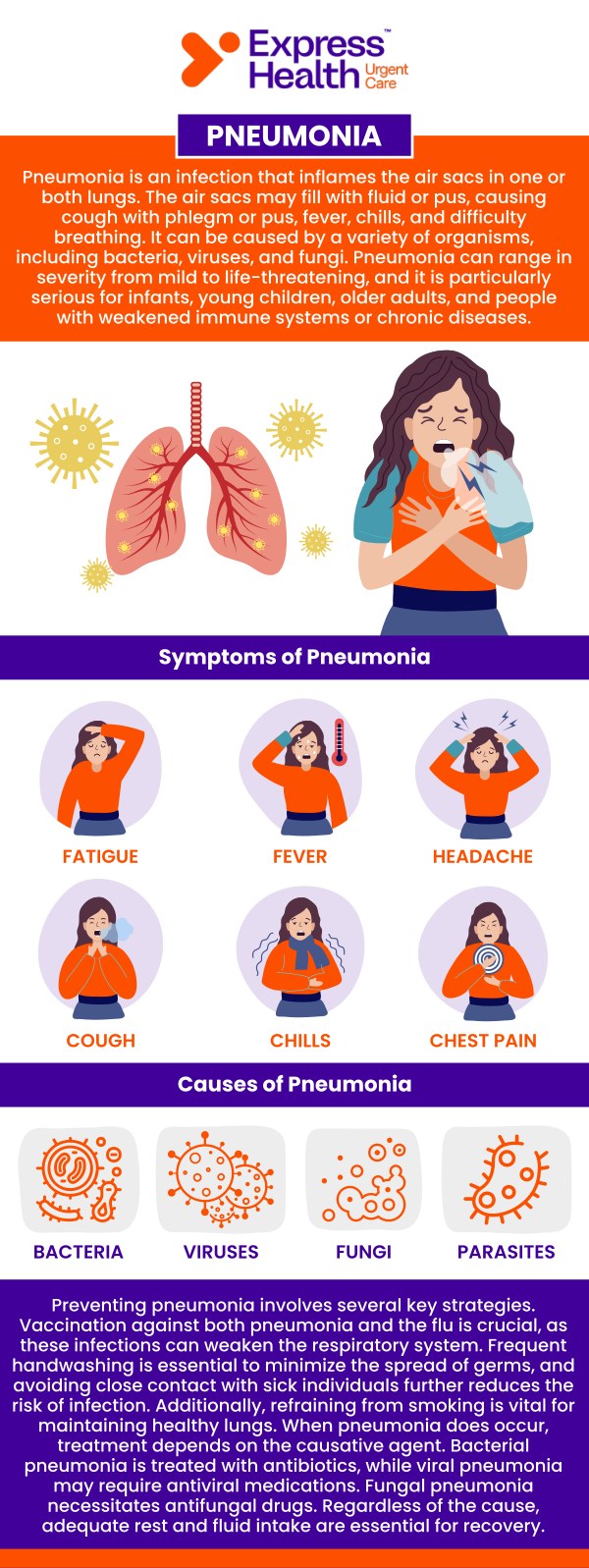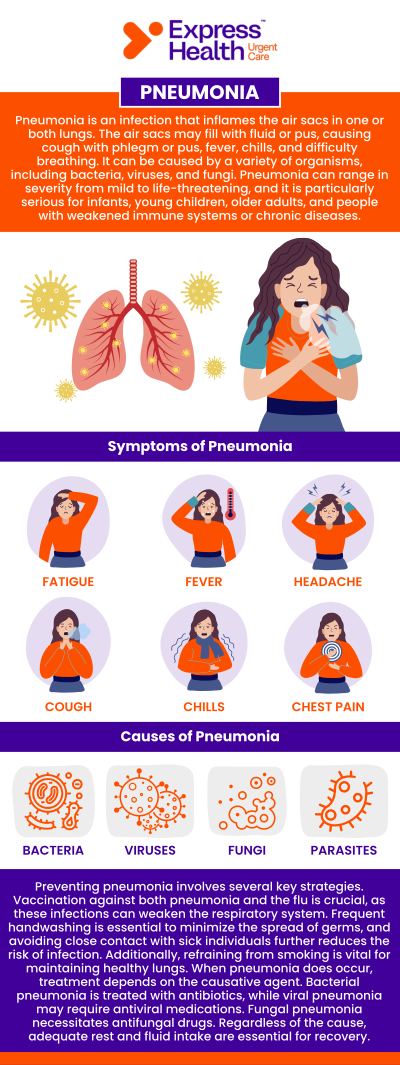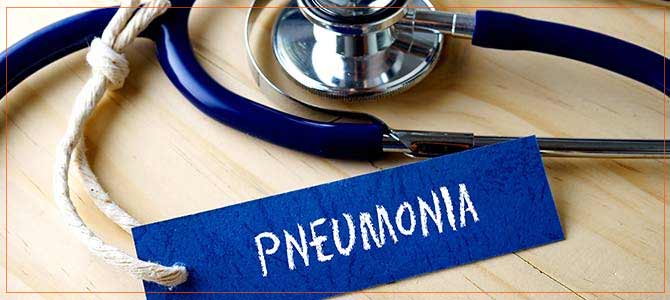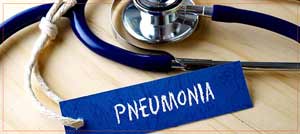Pneumonia Treatment Clinic Q&A
Pneumonia is an infection that causes inflammation of the air sacs in one or both lungs, the sacs will with pus which causes a cough with phlegm or pus and fever, chills, fatigue, sweating, and difficulty breathing. Our medical professionals at Express Health Urgent Care offer Pneumonia treatment. For more information, contact us or book an appointment online. We have convenient locations in East Harlem, NY, Metropolitan, NY, and Staten Island, NY.




Table of Contents:
What are the symptoms of pneumonia?
What causes pneumonia?
Can Pneumonia be prevented?
It can range from mild to life-threatening and is caused by bacteria, viruses, and fungi. It is known to be more serious for infants, young children, people older than 65, and people with compromised or weakened immune systems, but anyone can get it. You can also have it and not even know it, which is known as walking pneumonia. If you have bacterial pneumonia or a virus, it can spread to others. Smoking and drinking too much alcohol can raise your chances of getting pneumonia.
Symptoms of pneumonia can depend on your age and overall health, it can develop over several days, they include chest pain when you cough or breathe when coughing you produce phlegm or mucus, you are fatigued and have a loss of appetite, along with fever, chills and sweating vomiting, diarrhea, and nausea.
Some older adults with weak immune systems may experience confusion and a lower-than-normal body temperature. Infants may not show symptoms and may only show symptoms of fever, vomiting, or cough and will seem restless or tired. You also may have physical aches or stiffness in your joints after contracting pneumonia. Some people develop areas of bluish skin, usually on the lips and fingertips. This would be a sign of a lack of oxygen, and you should seek medical attention so it can be monitored. If this occurs in an infant, it will need to be carefully monitored.
Pneumonia is an infection that is very common and can cause severe illness and accumulation of fluid or phlegm filling the lungs. Bacteria is the most common cause of pneumonia and is usually the result of a secondary infection known as streptococcus pneumonia, which is due to different bacterial species. Atypical pneumonia is usually only present in the last half of the year, the summer and winter months. Mycoplasma pneumonia is another bacterial type of pneumonia. There are a few different types of bacterial pneumonia, but they all have the same effects and symptoms. When you are plagued with viral pneumonia, antibiotics generally don’t respond well to it.
Rhinovirus, adenoviruses, influenza, respiratory syncytial virus, and parainfluenza all have the likelihood of turning into pneumonia depending on the severity of the viral infection. There is also a fungal form of pneumonia where one or both lungs are affected. It is usually caused by the inhalation of spores; there are two main types: opportunistic and endemic fungi. Fungal pneumonia is rare and usually contracted in regions where endemic fungi are present. For further assistance and to feel better, you can also visit our walk-in urgent care clinic.
People with compromised immune systems, such as those with HIV/AIDS, cancer, or those undergoing immunosuppressive treatments, are at a greater risk of developing pneumonia. Frequent or inappropriate use of antibiotics can lead to antibiotic resistance, making individuals more susceptible to nosocomial pneumonia (hospital-acquired pneumonia), which is caused by resistant bacteria. Nosocomial pneumonia is more common in healthcare settings like hospitals, nursing homes, and rehabilitation centers, where patients are exposed to higher concentrations of these pathogens.
Another potential cause of pneumonia is Legionnaires’ disease, which is caused by the bacteria Legionella pneumophila. This bacterium is typically found in contaminated water sources such as air conditioning units, hot tubs, and poorly maintained water systems. If a doctor suspects pneumonia, they will typically order blood tests to check for infection, a chest X-ray to examine the lungs, and pulse oximetry to measure oxygen levels in the blood. A sputum test may also be performed to analyze the fluid in the lungs and identify the underlying cause of the infection.
Reducing the risk of pneumonia can be done by getting vaccinated against influenza as it is a common cause of pneumonia, children under the age of 2 and children between the ages of two to five with chronic conditions such as chronic lung disease and diabetes, adults between 19-64 with chronic health conditions such as COPD, heart disease, and diabetes should all get vaccinated against pneumococcal pneumonia common bacterial pneumonia. Wash your hands frequently, especially after coughing, blowing your nose, and using the bathroom, and before eating and preparing food.
Being aware of your general health. Pneumonia can follow respiratory infections, so be aware of your symptoms that linger longer than a few days. Good health habits like healthy eating and regular exercise can help you avoid getting sick and have a faster recovery when you do. Managing other health conditions and making sure that any other symptoms are looked after promptly. No one likes to get sick, so making your health a priority will be beneficial in the long run. For more information, contact us or book an appointment online. We have convenient locations in East Harlem, NY, Metropolitan, NY, and Staten Island, NY. We serve patients from East Harlem, Manhattan, Brooklyn, Williamsburg, Greenpoint, Staten Island, Rossville, Tottenville, the Metropolitan New York City area, and surrounding neighborhoods in NY.


Additional Services You May Need
▸ Broken Bone and Fractures
▸ Chronic Disease Management
▸ COVID-19 Testing
▸ DMV Vision Tests
▸ Drug Testing/Screening
▸ EKG Services
▸ Illness and Injuries
▸ IV Fluids/Medications
▸ On-Site Lab + X-Ray
▸ STD Testing
▸ Stitches
▸ UTI Treatments
▸ Urgent Care
▸ Splinting
▸ Abdominal Pain
▸ Flu Test
▸ Sore Throat
▸ Blood Work
▸ Flu Vaccines
▸ Urine Test
▸ Pediatrics Services
▸ Adult Treatments



